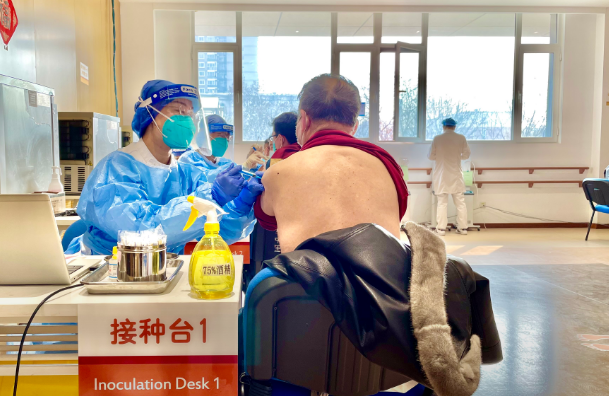source: editor:张悦

A temporary COVID-19 vaccination site in Xicheng District of Beijing welcomed its oldest recipient on Tuesday morning, 93-year-old Gao Jingjie, who said she immediately registered after receiving a phone call from her community.
"I feel very lucky that I can be part of the vaccination program," Gao said. "I'll feel more at ease after getting the vaccine. I'm in very good health and an optimistic person. I believe in modern medicine."
Beijing kicked off its COVID-19 vaccination program early this year with high-risk individuals. The first stage finished before the Chinese Lunar New Year. And now, mass vaccination is underway for the general public in all its 16 districts.
"On February 8, we started to inoculate people aged between 18 and 59. And on March 6, we expanded the coverage to people aged above 60," said Zheng Ying, director of Beijing Guangwai Health Service Center.
Medical workers are more careful with the senior recipients as they might have underlying conditions. Before getting the jab, doctors ask about their health conditions, such as blood pressure and blood sugar levels, to assess whether or not they can be inoculated. Each temporary vaccination site has an emergency doctors' station in the observation area in case of any adverse side effects.
"If the recipients feel chest pain, we can perform an ECG (electrocardiogram) here," Jiang Shan, a doctor from Beijing Guangwai Hospital who has been dispatched to the vaccination site, told CGTN. "This is an oxygen generator. We can give them oxygen if they need. We even have a defibrillator here."
He added that so far, no one at the site has shown severe adverse side effects, so none of the equipment has been used.
"We've also prepared medication here, including blood pressure pills, and medicine to treat angina, arrhythmia and allergies in case someone might need it," the doctor said.
People get vaccinated at a COVID-19 vaccination site in Dongcheng District, Beijing, February 15, 2021. /CFP
At an online forum attended by healthcare experts from both China and the U.S. earlier this month, leading Chinese respiratory expert Zhong Nanshan said China has inoculated nearly 3.5 percent of its population so far, and plans to vaccinate 40 percent of people by the end of June.
Beijing Center for Disease Prevention and Control earlier said vaccination work for people under the age of 18 will also be arranged as the next step in accordance with the research and results from follow-up clinical trials.
China has promised that the cost of COVID-19 vaccination, including both vaccine expenses and inoculation fees, will be covered by the medical insurance fund and the government reserves, rather than individuals.
The Chinese mainland registered five new COVID-19 infections on Wednesday, all of which were from overseas, and no new domestic confirmed cases have been reported here since February 15 this year.